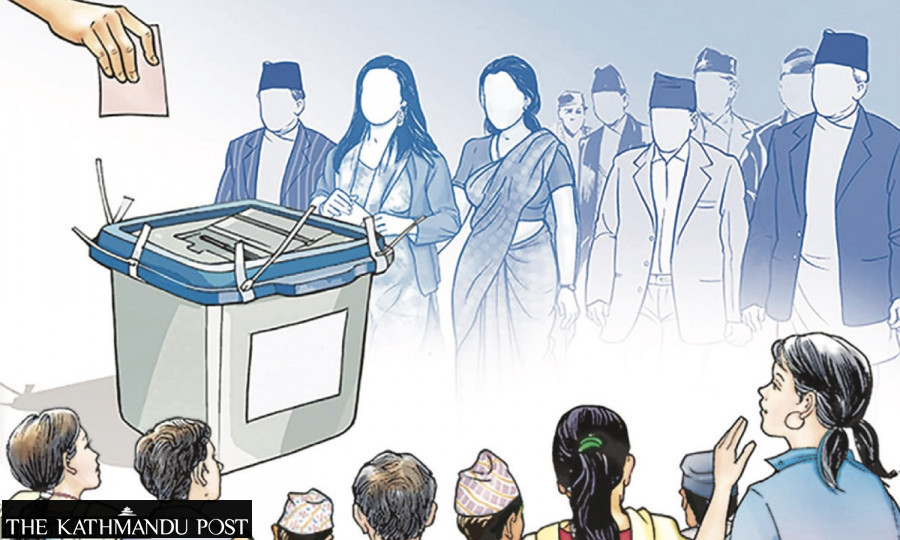Politics
New push for a law to raise vote threshold to secure PR seats
In amendments proposed in the bill to integrate election laws, the poll commission gives voters the NOTA option.
Binod Ghimire
The government is pushing ahead with a law to double the threshold for the representation of the parties in the House of Representatives and the provincial assemblies.
In the draft bill to Amend and Consolidate the Election Law forwarded to the Election Commission for review, the Ministry of Home Affairs has increased the threshold for the House to five percent and to three percent for the provincial assemblies.
In July last year, the constitutional election body had forwarded the draft amendments to the ministry, retaining the existing threshold of 3 and 1.5 percentages in the House and the provincial assemblies, respectively. However, the home ministry has revised the provision, making it more difficult for fringe parties to secure their presence in the legislature.
“The home ministry has made some changes in the draft bill, including in the threshold [provision]. We are reviewing it,” a senior official at the commission told the Post.
Currently, only the parties securing a minimum of 1.5 percent of the total valid votes under the proportional representation (PR) category in the provincial assemblies are given PR seats. The threshold is three percent at the federal level. These provisions were inserted through an amendment to the Election Act in July 2017, amid reservations from fringe parties.
The CPN-UML, the Nepali Congress, the CPN (Maoist Centre) and four other parties managed to cross the three percent threshold in the 2022 parliamentary elections. The smaller forces with the national party status are the Rastriya Swatantra Party, Rastriya Prajatantra Party, Janata Samajbadi Party Nepal, and Janamat Party. Only five parties got the minimum five percent votes under the proportional system in 2022.
The election commission has proposed 27 revisions to the electoral law through the amendment draft, including a provision to enable Nepali citizens living abroad to exercise their franchise. The commission has proposed provisions to allow them to vote under the PR category via Nepal’s diplomatic missions in the respective countries.
The government has also made slight changes to the provision. It proposes that voting platforms can be offered after evaluating its feasibility in the host country, said the official. “There are no major changes in other provisions.”
As per the commission’s amendment proposal, a candidate having been elected twice should be barred from standing in the proportional representation category again. There are currently no legal limits to how many times candidates can fight elections.
The commission has also proposed that a candidate who has lost elections (local, provincial or federal) shall not be allowed to file candidacy from another constituency in either of the categories for five years, except for the by-election in the respective constituency.
Moreover, the commission also plans to introduce the right to reject any candidate, with the ‘NOTA’ sign included in the ballot paper. For the first time in Nepal’s election history, the commission has proposed the NOTA [none of the above] option for voters who don’t want to vote for any of the candidates on the ballot. If NOTA votes exceed 50 percent of the total valid votes, the election will be cancelled.
In the draft bill to amend election laws, the commission seeks to make it mandatory for the political parties to field at least 33 percent women candidates for the first-past-the-post polls. The commission says the changes have been proposed in the new integrated election law to replace seven different existing laws. The changes are based on Nepal’s constitution, the directives of the Supreme Court and past experiences.
Enlisting voters through the electronic medium, collecting details of Nepali citizens living abroad to update the voter roll, and fixing the election day and duration of publicity campaigns are other proposed revisions.
To ensure better representation of women, one of the two candidates for chairperson and vice-chair of rural municipalities or mayor and deputy mayor of municipalities must be a woman. The bill proposes that at least 33 percent of ward chair candidates must be women.
Another proposal is that all candidates must submit their property details (including assets owned by their family members) while filing their candidacy.
To avoid confusion over the start and end of the terms of elected representatives, the bill says it begins on the day of election for all winners of the House of Representatives, Provincial Assembly, and local government positions, while their term ends the day they file candidacy for the next election.
Other proposed revisions require candidates to use the bank accounts to fund their campaigns declared while registering their candidacy, and allowing public transport on election day.
To urge the government to register the bill in Parliament without delay, a team led by Chief Election Commissioner Dinesh Thapaliya on Wednesday met with Minister for Home Affairs Ramesh Lekhak.
“The home minister assured us that the bill would be registered in the ongoing session of Parliament. I find the government serious about the issue this time,” Thapaliya told the Post.




 8.26°C Kathmandu
8.26°C Kathmandu















